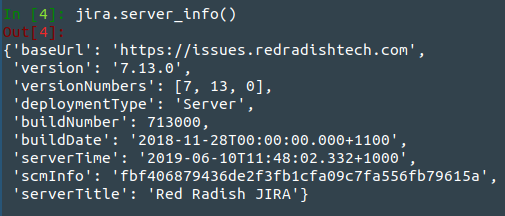...
| Excerpt |
|---|
If you are writing a script that interacts with Jira through a REST API, you should authenticate using an OAuth token, rather than an embedded username/password. Here we describe one way to do the 'oauth dance' to generate a trusted token using Python 3 - specifically the |
There are many attempts to explain this process on the internet. Every one I have found has been awful: either hand-waving away details, or too dense, trying to explain the mechanics of OAuth with missionary zeal. Just tell me what to type and where to click, and give me my token!This guide is admittedly also awful (partly due to jirashell bugs), but if you follow the steps carefully it should work without much thinking.
| Table of Contents |
|---|
On with the instructions.
Establishing OAuth trust
Install Python 3
Running python3 or python --version should show Python 3.x.
Create a venv
| Code Block |
|---|
mkdir jira-oauth cd jira-oauth python3 -m venv venv . venv/bin/activate |
Install Python libraries
| Code Block |
|---|
pip3 install jira ipython |
Generate an RSA public key
| Code Block |
|---|
openssl genrsa -out rsa.pem 2048 openssl rsa -in rsa.pem -pubout -out rsa.pub |
Create an application link
In Jira (or Confluence), create an applink. Applinks normally connect to other HTTP apps, but in this case our OAuth client doesn't have a URL, so use a fake one.
...
Click 'Continue', and your application link will be created.
OAuth dance
Now from your terminal, do the OAuth dance with your Jira installation:
...
| Code Block |
|---|
<JIRA Shell 2.0.0 (https://issues.redradishtech.com)> *** JIRA shell active; client is in 'jira'. Press Ctrl-D to exit. In [1]: |
...
Type oauth to print the OAuth object:
Now press ctrl-d to exit
Press ctrl-d to exit.
Print your OAuth token
Jira trusts us. Now we need to print the token. Add --print-tokens to the last command:
| Code Block |
|---|
jirashell --server https://issues.redradishtech.com --consumer-key monitor-jira-license --key-cert rsa.pem --oauth-dance --print-tokens |
Output looks like:
| Code Block |
|---|
Request tokens received.
Request token: kLYKeT0g9EiJDDmqlxQTH9VjRs2fpFS6
Request token secret: snhWUlGQmzLu6I9ju1aQGNjulQQPT1lz
Please visit this URL to authorize the OAuth request:
https://issues.redradishtech.com/plugins/servlet/oauth/authorize?oauth_token=kLYKeT0g9EiJDDmqlxQTH9VjRs2fpFS6
Have you authorized this program to connect on your behalf to https://issues.redradishtech.com? (y/n) |
Hit n to abort.
Test your OAuth token
Now embed the 'Request token' and 'Request token secret' values you saw above into a new jirashell command:
| Code Block |
|---|
jirashell --server https://issues.redradishtech.com --consumer-key monitor-jira-license --access-token kLYKeT0g9EiJDDmqlxQTH9VjRs2fpFS6A56FItjuH3jfcCs4aYS57gzXnAPXk2Zt --access-token-secret snhWUlGQmzLu6I9ju1aQGNjulQQPT1lzt8JaIJGSsxqZLRQoDQbQYm9f761zgvPs --key-cert rsa.pem <<< 'jira.server_info()' |
...
| Code Block |
|---|
<JIRA Shell 2.0.0 (https://issues.redradishtech.com)>
*** JIRA shell active; client is in 'jira'. Press Ctrl-D to exit.
In [1]: Out[1]:
{'baseUrl': 'https://issues.redradishtech.com',
'version': '7.13.0',
'versionNumbers': [7, 13, 0],
'deploymentType': 'Server',
'buildNumber': 713000,
'buildDate': '2018-11-28T00:00:00.000+1100',
'scmInfo': 'fbf406879436de2f3fb1cfa09c7fa556fb79615a',
'serverTitle': 'Red Radish JIRA'}
In [2]: Do you really want to exit ([y]/n)? |
Conclusion
You now have the three things you need for your script: the token, the token secret, and rsa.pub private key.
Using jirashell as a base for your script
If Note that if your script is Python, you can use jirashell as a library to handle all the ugly command-line parsing. In my case:
| Code Block |
|---|
$ cp venv/bin/jirashell check-jira-license $ vim check-jira-license # Make changes $ cat check-jira-license #!/home/jturner/src/redradish/nagios-jira-license/venv/bin/python3 # -*- coding: utf-8 -*- import re import sys from jira.jirashell import *get_config, JIRA def main(): options, basic_auth, oauth = get_config() jira = JIRA(options=options, basic_auth=basic_auth, oauth=oauth) print(jira.server_info()) if __name__ == '__main__': sys.exit(main()) |
This command can then be invoked using the same command-line flags as jirashell :
| Code Block |
|---|
./check-jira-license --server https://issues.redradishtech.com --consumer-key monitor-jira-license --access-token kLYKeT0g9EiJDDmqlxQTH9VjRs2fpFS6 --access-token-secret snhWUlGQmzLu6I9ju1aQGNjulQQPT1lz --key-cert rsa.pem |
Some JIRA REST calls are not wrapped in the Python JIRA library. For those, you can use the OAuth credentials with the requests library directly, as follows:
| Code Block |
|---|
#!/home/jturner/src/redradish/nagios-jira-license/venv/bin/python3
# -*- coding: utf-8 -*-
import re
import sys
from jira.jirashell import get_config, JIRA
import requests
def getlicensecounts(options, jira):
url=options['server'] + '/rest/plugins/applications/1.0/installed/jira-software'
response = requests.get(url, auth=jira._session.auth)
responsejson = response.json()
return (responsejson['accessDetails']['activeUserCount'], responsejson['accessDetails']['licensedUserCount'])
def main():
options, basic_auth, oauth = get_config()
jira = JIRA(options=options, oauth=oauth)
activecount, totalcount = getlicensecounts(options, jira)
print(f"Using {activecount} of {totalcount} license slots")
if __name__ == '__main__':
sys.exit(main()) |
You can invoke non-REST ( /secure/admin/* ) URLs with OAuth credentials too, but Jira's "websudo" authentication will demand a password, rendering OAuth useless.

